Essay on Corporate Social Responsibility and Governance
VerifiedAdded on 2022/11/26
|17
|3878
|413
Essay
AI Summary
This essay provides a comprehensive overview of Corporate Social Responsibility (CSR) and Corporate Governance. It begins by exploring the evolution of CSR, its various definitions, and the absence of a universally accepted definition, emphasizing the influence of context and stakeholders. The essay then delves into the legal aspects of CSR, particularly within the Australian context, referencing the Corporations Act 2001 and the role of regulatory bodies like ASIC. It examines the codes of conduct, ESG criteria, and the UN's Principles for Responsible Investment (PRI). The discussion extends to real-world examples such as the ASIC v National Australia Bank case and the James Hardie litigation to illustrate the implications of corporate behavior and the 'Duty of Care.' The essay concludes by arguing that ethical considerations should take precedence over legal compliance, with a strong emphasis on creating a culture of integrity and responsible corporate citizenship.

Running Head: CSR AND CORPORATE GOVERNANCE
CSR and Corporate Governance
Name of the Student
Name of the University
Author Note
CSR and Corporate Governance
Name of the Student
Name of the University
Author Note
Paraphrase This Document
Need a fresh take? Get an instant paraphrase of this document with our AI Paraphraser
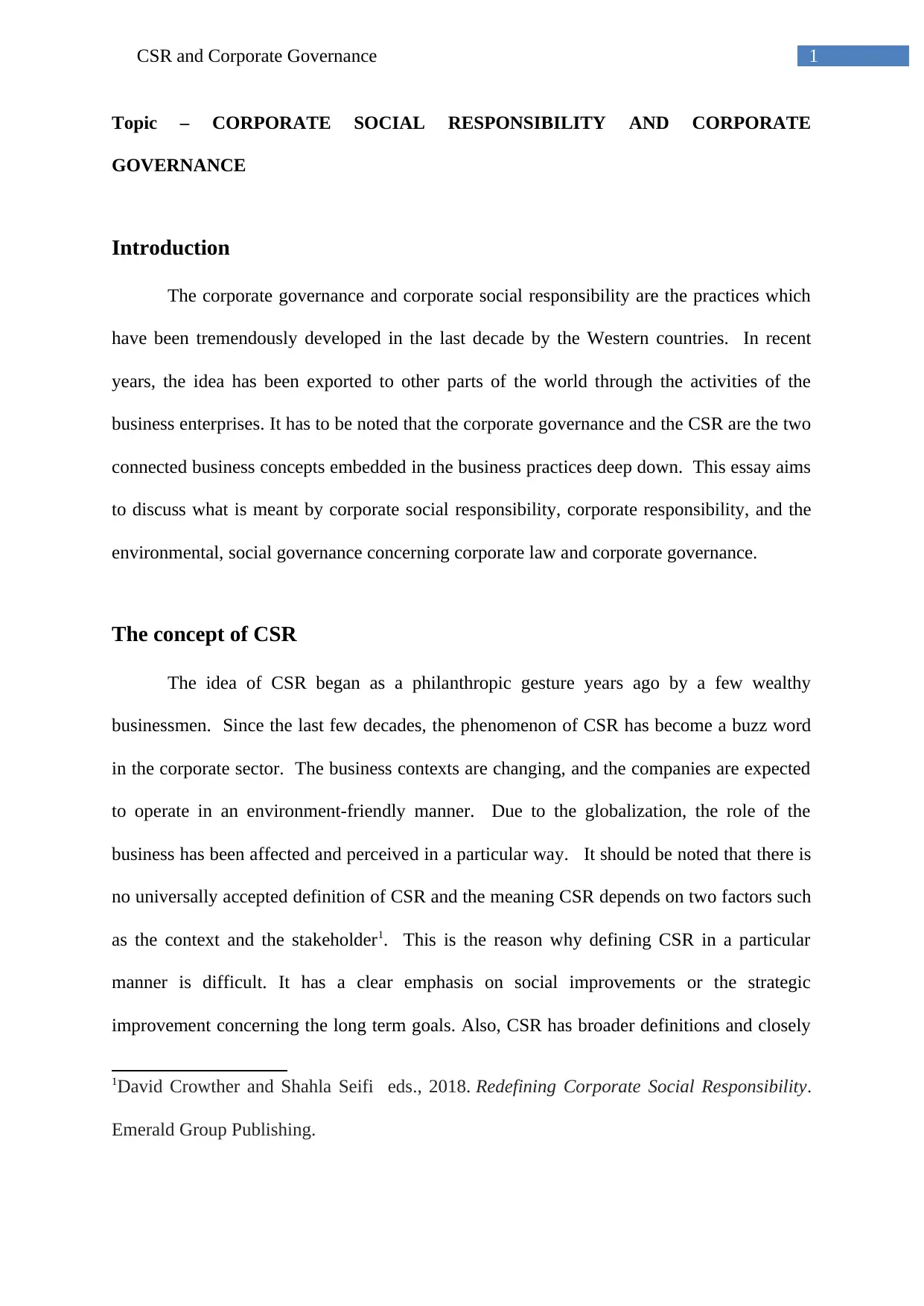
1CSR and Corporate Governance
Topic – CORPORATE SOCIAL RESPONSIBILITY AND CORPORATE
GOVERNANCE
Introduction
The corporate governance and corporate social responsibility are the practices which
have been tremendously developed in the last decade by the Western countries. In recent
years, the idea has been exported to other parts of the world through the activities of the
business enterprises. It has to be noted that the corporate governance and the CSR are the two
connected business concepts embedded in the business practices deep down. This essay aims
to discuss what is meant by corporate social responsibility, corporate responsibility, and the
environmental, social governance concerning corporate law and corporate governance.
The concept of CSR
The idea of CSR began as a philanthropic gesture years ago by a few wealthy
businessmen. Since the last few decades, the phenomenon of CSR has become a buzz word
in the corporate sector. The business contexts are changing, and the companies are expected
to operate in an environment-friendly manner. Due to the globalization, the role of the
business has been affected and perceived in a particular way. It should be noted that there is
no universally accepted definition of CSR and the meaning CSR depends on two factors such
as the context and the stakeholder1. This is the reason why defining CSR in a particular
manner is difficult. It has a clear emphasis on social improvements or the strategic
improvement concerning the long term goals. Also, CSR has broader definitions and closely
1David Crowther and Shahla Seifi eds., 2018. Redefining Corporate Social Responsibility.
Emerald Group Publishing.
Topic – CORPORATE SOCIAL RESPONSIBILITY AND CORPORATE
GOVERNANCE
Introduction
The corporate governance and corporate social responsibility are the practices which
have been tremendously developed in the last decade by the Western countries. In recent
years, the idea has been exported to other parts of the world through the activities of the
business enterprises. It has to be noted that the corporate governance and the CSR are the two
connected business concepts embedded in the business practices deep down. This essay aims
to discuss what is meant by corporate social responsibility, corporate responsibility, and the
environmental, social governance concerning corporate law and corporate governance.
The concept of CSR
The idea of CSR began as a philanthropic gesture years ago by a few wealthy
businessmen. Since the last few decades, the phenomenon of CSR has become a buzz word
in the corporate sector. The business contexts are changing, and the companies are expected
to operate in an environment-friendly manner. Due to the globalization, the role of the
business has been affected and perceived in a particular way. It should be noted that there is
no universally accepted definition of CSR and the meaning CSR depends on two factors such
as the context and the stakeholder1. This is the reason why defining CSR in a particular
manner is difficult. It has a clear emphasis on social improvements or the strategic
improvement concerning the long term goals. Also, CSR has broader definitions and closely
1David Crowther and Shahla Seifi eds., 2018. Redefining Corporate Social Responsibility.
Emerald Group Publishing.
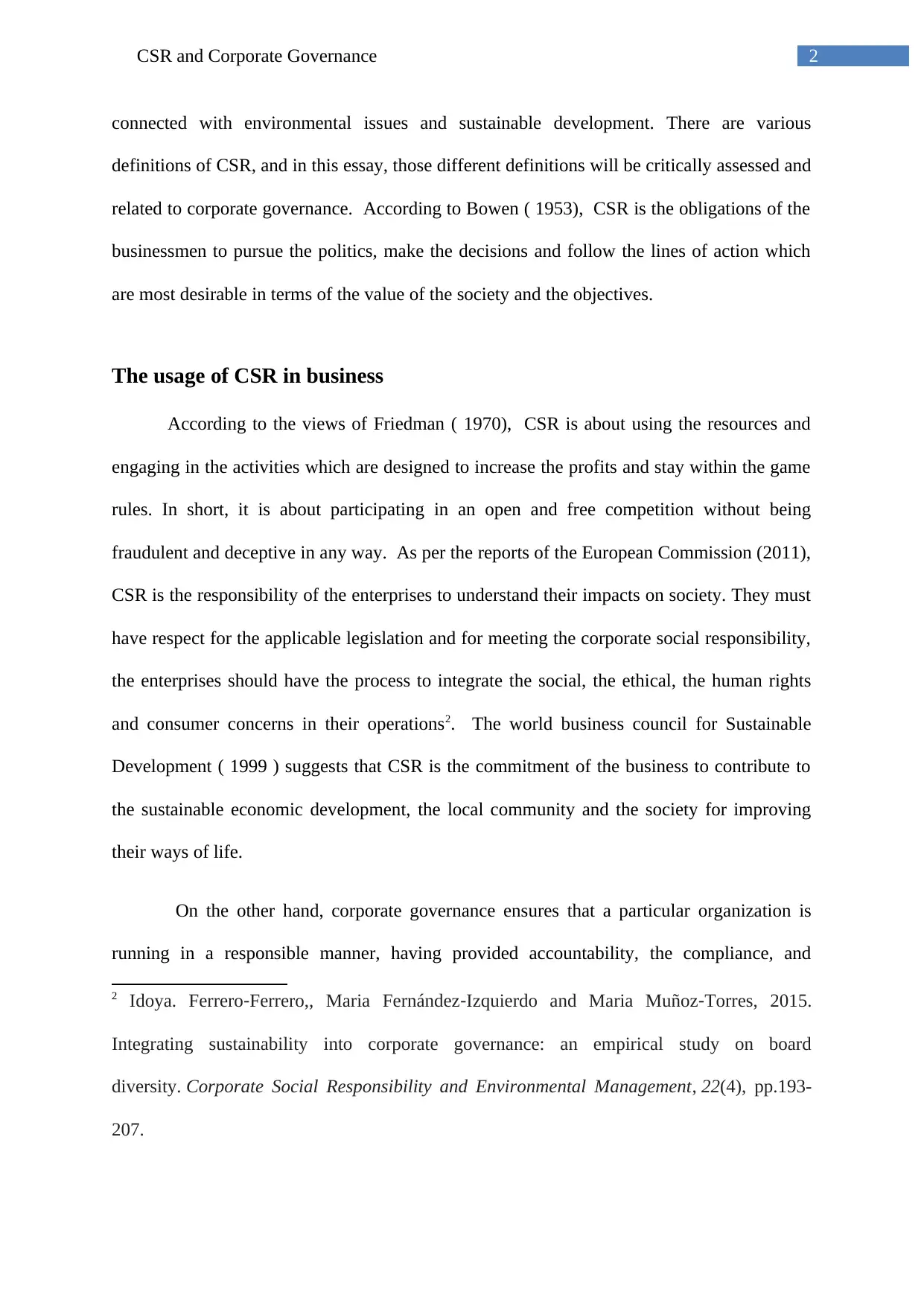
2CSR and Corporate Governance
connected with environmental issues and sustainable development. There are various
definitions of CSR, and in this essay, those different definitions will be critically assessed and
related to corporate governance. According to Bowen ( 1953), CSR is the obligations of the
businessmen to pursue the politics, make the decisions and follow the lines of action which
are most desirable in terms of the value of the society and the objectives.
The usage of CSR in business
According to the views of Friedman ( 1970), CSR is about using the resources and
engaging in the activities which are designed to increase the profits and stay within the game
rules. In short, it is about participating in an open and free competition without being
fraudulent and deceptive in any way. As per the reports of the European Commission (2011),
CSR is the responsibility of the enterprises to understand their impacts on society. They must
have respect for the applicable legislation and for meeting the corporate social responsibility,
the enterprises should have the process to integrate the social, the ethical, the human rights
and consumer concerns in their operations2. The world business council for Sustainable
Development ( 1999 ) suggests that CSR is the commitment of the business to contribute to
the sustainable economic development, the local community and the society for improving
their ways of life.
On the other hand, corporate governance ensures that a particular organization is
running in a responsible manner, having provided accountability, the compliance, and
2 Idoya. Ferrero‐Ferrero,, Maria Fernández‐Izquierdo and Maria Muñoz‐Torres, 2015.
Integrating sustainability into corporate governance: an empirical study on board
diversity. Corporate Social Responsibility and Environmental Management, 22(4), pp.193-
207.
connected with environmental issues and sustainable development. There are various
definitions of CSR, and in this essay, those different definitions will be critically assessed and
related to corporate governance. According to Bowen ( 1953), CSR is the obligations of the
businessmen to pursue the politics, make the decisions and follow the lines of action which
are most desirable in terms of the value of the society and the objectives.
The usage of CSR in business
According to the views of Friedman ( 1970), CSR is about using the resources and
engaging in the activities which are designed to increase the profits and stay within the game
rules. In short, it is about participating in an open and free competition without being
fraudulent and deceptive in any way. As per the reports of the European Commission (2011),
CSR is the responsibility of the enterprises to understand their impacts on society. They must
have respect for the applicable legislation and for meeting the corporate social responsibility,
the enterprises should have the process to integrate the social, the ethical, the human rights
and consumer concerns in their operations2. The world business council for Sustainable
Development ( 1999 ) suggests that CSR is the commitment of the business to contribute to
the sustainable economic development, the local community and the society for improving
their ways of life.
On the other hand, corporate governance ensures that a particular organization is
running in a responsible manner, having provided accountability, the compliance, and
2 Idoya. Ferrero‐Ferrero,, Maria Fernández‐Izquierdo and Maria Muñoz‐Torres, 2015.
Integrating sustainability into corporate governance: an empirical study on board
diversity. Corporate Social Responsibility and Environmental Management, 22(4), pp.193-
207.
⊘ This is a preview!⊘
Do you want full access?
Subscribe today to unlock all pages.

Trusted by 1+ million students worldwide
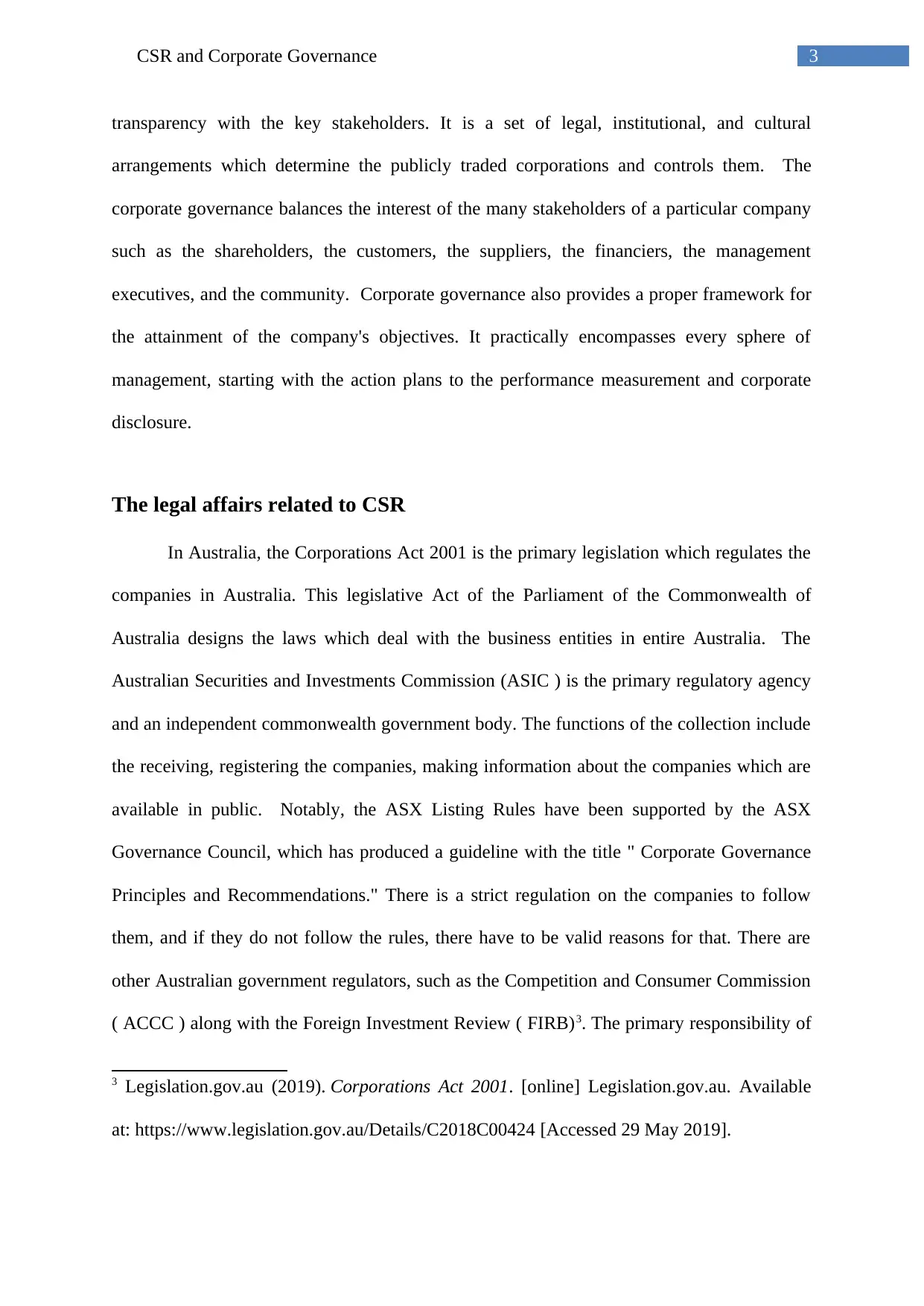
3CSR and Corporate Governance
transparency with the key stakeholders. It is a set of legal, institutional, and cultural
arrangements which determine the publicly traded corporations and controls them. The
corporate governance balances the interest of the many stakeholders of a particular company
such as the shareholders, the customers, the suppliers, the financiers, the management
executives, and the community. Corporate governance also provides a proper framework for
the attainment of the company's objectives. It practically encompasses every sphere of
management, starting with the action plans to the performance measurement and corporate
disclosure.
The legal affairs related to CSR
In Australia, the Corporations Act 2001 is the primary legislation which regulates the
companies in Australia. This legislative Act of the Parliament of the Commonwealth of
Australia designs the laws which deal with the business entities in entire Australia. The
Australian Securities and Investments Commission (ASIC ) is the primary regulatory agency
and an independent commonwealth government body. The functions of the collection include
the receiving, registering the companies, making information about the companies which are
available in public. Notably, the ASX Listing Rules have been supported by the ASX
Governance Council, which has produced a guideline with the title " Corporate Governance
Principles and Recommendations." There is a strict regulation on the companies to follow
them, and if they do not follow the rules, there have to be valid reasons for that. There are
other Australian government regulators, such as the Competition and Consumer Commission
( ACCC ) along with the Foreign Investment Review ( FIRB)3. The primary responsibility of
3 Legislation.gov.au (2019). Corporations Act 2001. [online] Legislation.gov.au. Available
at: https://www.legislation.gov.au/Details/C2018C00424 [Accessed 29 May 2019].
transparency with the key stakeholders. It is a set of legal, institutional, and cultural
arrangements which determine the publicly traded corporations and controls them. The
corporate governance balances the interest of the many stakeholders of a particular company
such as the shareholders, the customers, the suppliers, the financiers, the management
executives, and the community. Corporate governance also provides a proper framework for
the attainment of the company's objectives. It practically encompasses every sphere of
management, starting with the action plans to the performance measurement and corporate
disclosure.
The legal affairs related to CSR
In Australia, the Corporations Act 2001 is the primary legislation which regulates the
companies in Australia. This legislative Act of the Parliament of the Commonwealth of
Australia designs the laws which deal with the business entities in entire Australia. The
Australian Securities and Investments Commission (ASIC ) is the primary regulatory agency
and an independent commonwealth government body. The functions of the collection include
the receiving, registering the companies, making information about the companies which are
available in public. Notably, the ASX Listing Rules have been supported by the ASX
Governance Council, which has produced a guideline with the title " Corporate Governance
Principles and Recommendations." There is a strict regulation on the companies to follow
them, and if they do not follow the rules, there have to be valid reasons for that. There are
other Australian government regulators, such as the Competition and Consumer Commission
( ACCC ) along with the Foreign Investment Review ( FIRB)3. The primary responsibility of
3 Legislation.gov.au (2019). Corporations Act 2001. [online] Legislation.gov.au. Available
at: https://www.legislation.gov.au/Details/C2018C00424 [Accessed 29 May 2019].
Paraphrase This Document
Need a fresh take? Get an instant paraphrase of this document with our AI Paraphraser
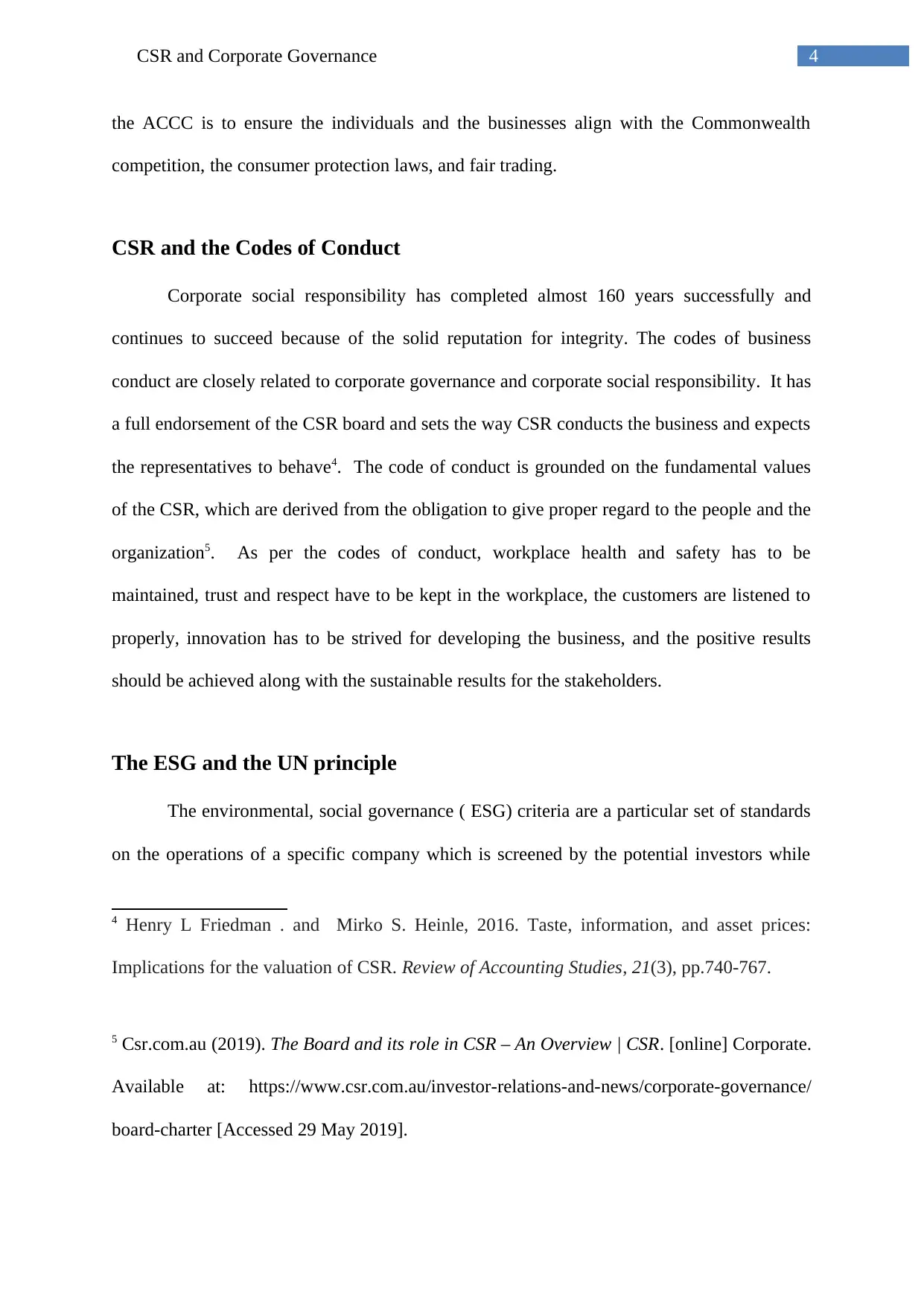
4CSR and Corporate Governance
the ACCC is to ensure the individuals and the businesses align with the Commonwealth
competition, the consumer protection laws, and fair trading.
CSR and the Codes of Conduct
Corporate social responsibility has completed almost 160 years successfully and
continues to succeed because of the solid reputation for integrity. The codes of business
conduct are closely related to corporate governance and corporate social responsibility. It has
a full endorsement of the CSR board and sets the way CSR conducts the business and expects
the representatives to behave4. The code of conduct is grounded on the fundamental values
of the CSR, which are derived from the obligation to give proper regard to the people and the
organization5. As per the codes of conduct, workplace health and safety has to be
maintained, trust and respect have to be kept in the workplace, the customers are listened to
properly, innovation has to be strived for developing the business, and the positive results
should be achieved along with the sustainable results for the stakeholders.
The ESG and the UN principle
The environmental, social governance ( ESG) criteria are a particular set of standards
on the operations of a specific company which is screened by the potential investors while
4 Henry L Friedman . and Mirko S. Heinle, 2016. Taste, information, and asset prices:
Implications for the valuation of CSR. Review of Accounting Studies, 21(3), pp.740-767.
5 Csr.com.au (2019). The Board and its role in CSR – An Overview | CSR. [online] Corporate.
Available at: https://www.csr.com.au/investor-relations-and-news/corporate-governance/
board-charter [Accessed 29 May 2019].
the ACCC is to ensure the individuals and the businesses align with the Commonwealth
competition, the consumer protection laws, and fair trading.
CSR and the Codes of Conduct
Corporate social responsibility has completed almost 160 years successfully and
continues to succeed because of the solid reputation for integrity. The codes of business
conduct are closely related to corporate governance and corporate social responsibility. It has
a full endorsement of the CSR board and sets the way CSR conducts the business and expects
the representatives to behave4. The code of conduct is grounded on the fundamental values
of the CSR, which are derived from the obligation to give proper regard to the people and the
organization5. As per the codes of conduct, workplace health and safety has to be
maintained, trust and respect have to be kept in the workplace, the customers are listened to
properly, innovation has to be strived for developing the business, and the positive results
should be achieved along with the sustainable results for the stakeholders.
The ESG and the UN principle
The environmental, social governance ( ESG) criteria are a particular set of standards
on the operations of a specific company which is screened by the potential investors while
4 Henry L Friedman . and Mirko S. Heinle, 2016. Taste, information, and asset prices:
Implications for the valuation of CSR. Review of Accounting Studies, 21(3), pp.740-767.
5 Csr.com.au (2019). The Board and its role in CSR – An Overview | CSR. [online] Corporate.
Available at: https://www.csr.com.au/investor-relations-and-news/corporate-governance/
board-charter [Accessed 29 May 2019].

5CSR and Corporate Governance
making investments. The environmental rules show the way a company performs and
whether their actions are harming nature or not. The social criteria measure the company
based on their relationship with the suppliers, the customers, the employees, and the
communities. In recent years, there have been many administrative activities to make the
CSR and other ethical concerns mandatory for all types of organizations. As per the UN
principle of the responsible investment ( PRI), the investors should focus on the increasing
relevance of the ESG issues. The laws are entirely voluntary and aspirational being subject to
the fiduciary duties. As per the first principle, the ESG issues will be incorporated into the
investment analysis and the decision making process. As per the second principle, the ESG
issue has to be incorporated into the ownership policies and the practices. The third principle
suggests that there will be an appropriate disclosure on the ESG issues through the entities.
There will be promotion and acceptance of the implementation of the policies in the
investment industry.
The incidents related to ESG reveals that there is a gap in the management system of
the corporations, their vulnerability in the corporate strategy, and few lapses in the policy
development. All of these are relevant to the analysis and evaluation of the company. The
ESG Reporting Guide for Australian companies ( 2015) as launched by the Financial
Services Council ( FSC ) aims at disclosing the ESG risks to the investors in a comparable
manner across various companies and the sectors. It also allows the investors along with the
asset owners to have a fuller understanding of the risk profiles and the growth prospects in
the future.
ASIC and the Corporation Act
In this regard, the incident of Australian Securities and Investments (2018) need to be
mentioned. In the year 2018, it launched some proceedings against the National Australia
making investments. The environmental rules show the way a company performs and
whether their actions are harming nature or not. The social criteria measure the company
based on their relationship with the suppliers, the customers, the employees, and the
communities. In recent years, there have been many administrative activities to make the
CSR and other ethical concerns mandatory for all types of organizations. As per the UN
principle of the responsible investment ( PRI), the investors should focus on the increasing
relevance of the ESG issues. The laws are entirely voluntary and aspirational being subject to
the fiduciary duties. As per the first principle, the ESG issues will be incorporated into the
investment analysis and the decision making process. As per the second principle, the ESG
issue has to be incorporated into the ownership policies and the practices. The third principle
suggests that there will be an appropriate disclosure on the ESG issues through the entities.
There will be promotion and acceptance of the implementation of the policies in the
investment industry.
The incidents related to ESG reveals that there is a gap in the management system of
the corporations, their vulnerability in the corporate strategy, and few lapses in the policy
development. All of these are relevant to the analysis and evaluation of the company. The
ESG Reporting Guide for Australian companies ( 2015) as launched by the Financial
Services Council ( FSC ) aims at disclosing the ESG risks to the investors in a comparable
manner across various companies and the sectors. It also allows the investors along with the
asset owners to have a fuller understanding of the risk profiles and the growth prospects in
the future.
ASIC and the Corporation Act
In this regard, the incident of Australian Securities and Investments (2018) need to be
mentioned. In the year 2018, it launched some proceedings against the National Australia
⊘ This is a preview!⊘
Do you want full access?
Subscribe today to unlock all pages.

Trusted by 1+ million students worldwide

6CSR and Corporate Governance
Bank encouraging a long practice of charging fees for no service. Although the two firms
acknowledged the claim and agreed to pay back almost A$87 million to the customers, the
ASIC did not want the compensation. It asked for penalties for those who breached the ASIC
Act and the Corporations Act6. This reputational damage was asked to covey a powerful
message to the corporate across Australia that they are required to observe and respect the
law. In this regard, the Royal Commission stays in support of the Governance Culture and
Values, and the final report suggests that the enterprises must keep on mind that they took
money from the customers for nothing. This conduct cannot be seen as mere carelessness;
rather, it is an offense7. The Royal Commission further declared that the customers will be
paid $ 850 million as compensations and found out the root cause to be greed by the advisers
and desire by the licensees. Hence, the commission declared charging fees for no service to
be unacceptable culture and lack of professional conduct on the part of the managers. It
further reveals that under Section 1041G of CA, the engagement in fraudulent conduct in
relation to a financial product or the commercial service is strictly prohibited. The receipt of
money for doing nothing is a double action. Any contravention of this section is supposed to
be treated as a criminal activity.
As per the ASX CG P&R- Principle 3, the organizations should act responsibly and
ethically. It must go beyond the legal compliances or duties and encourage honesty and
integrity consistent with the expectation of the community. The organization/enterprise
6 Asic.gov.au (2019). ASIC Home | ASIC - Australian Securities and Investments
Commission. [online] Asic.gov.au. Available at: https://asic.gov.au [Accessed 29 May 2019].
7 Zhihong Wang and Joseph Sarkis, 2017. Corporate social responsibility governance,
outcomes, and financial performance. Journal of Cleaner Production, 162, pp.1607-1616.
Bank encouraging a long practice of charging fees for no service. Although the two firms
acknowledged the claim and agreed to pay back almost A$87 million to the customers, the
ASIC did not want the compensation. It asked for penalties for those who breached the ASIC
Act and the Corporations Act6. This reputational damage was asked to covey a powerful
message to the corporate across Australia that they are required to observe and respect the
law. In this regard, the Royal Commission stays in support of the Governance Culture and
Values, and the final report suggests that the enterprises must keep on mind that they took
money from the customers for nothing. This conduct cannot be seen as mere carelessness;
rather, it is an offense7. The Royal Commission further declared that the customers will be
paid $ 850 million as compensations and found out the root cause to be greed by the advisers
and desire by the licensees. Hence, the commission declared charging fees for no service to
be unacceptable culture and lack of professional conduct on the part of the managers. It
further reveals that under Section 1041G of CA, the engagement in fraudulent conduct in
relation to a financial product or the commercial service is strictly prohibited. The receipt of
money for doing nothing is a double action. Any contravention of this section is supposed to
be treated as a criminal activity.
As per the ASX CG P&R- Principle 3, the organizations should act responsibly and
ethically. It must go beyond the legal compliances or duties and encourage honesty and
integrity consistent with the expectation of the community. The organization/enterprise
6 Asic.gov.au (2019). ASIC Home | ASIC - Australian Securities and Investments
Commission. [online] Asic.gov.au. Available at: https://asic.gov.au [Accessed 29 May 2019].
7 Zhihong Wang and Joseph Sarkis, 2017. Corporate social responsibility governance,
outcomes, and financial performance. Journal of Cleaner Production, 162, pp.1607-1616.
Paraphrase This Document
Need a fresh take? Get an instant paraphrase of this document with our AI Paraphraser

7CSR and Corporate Governance
should be a good corporate citizen, and the board should create a culture which promotes the
core values. As per the principle, an organization cannot legislate for personal integrity, and
the codes of conduct should be encouraged among the organizational members8. The law also
suggests that an organization should go beyond the lip service, promote the reporting of
unlawful, and protect the ‘whistleblowers'.
CSR in relation with the Duty of Care
The ‘Duty of Care' has an in-depth relationship with CSR and corporate governance.
It is the legal responsibility of an organization to avoid any conducts or omissions, which
could be foreseen to cause harm to the surrounding people or society. Taken, for example, the
duty of care is the responsibility of an accountant to correctly prepare the tax returns of the
customer and minimize the chance of an IRS audit. On the same note, the duty of care of a
manufacturer is to ensure that the products are safe for public use. The case of James Hardie
litigation is in direct relation with the ‘duty of care.' In the year 2001, the James Hardie
group of companies were haunted entirely by a specter which was of the asbestos litigation. It
had been for so many months. The spectre was persistently examined at the board meetings,
and the Asbestos litigation was viewed as affecting the share price. It was also considered as
jeopardy of the subsidiaries' long term future. The high court affirmed that the organizations
should have the Duty to act in good faith and continuous disclosure law.
8 Asx.com.au (2019). [online] Available at: https://www.asx.com.au/.../asx.../cgc-principles-
and-recommendations-3rd-edn.pdf [Accessed 29 May 2019].
should be a good corporate citizen, and the board should create a culture which promotes the
core values. As per the principle, an organization cannot legislate for personal integrity, and
the codes of conduct should be encouraged among the organizational members8. The law also
suggests that an organization should go beyond the lip service, promote the reporting of
unlawful, and protect the ‘whistleblowers'.
CSR in relation with the Duty of Care
The ‘Duty of Care' has an in-depth relationship with CSR and corporate governance.
It is the legal responsibility of an organization to avoid any conducts or omissions, which
could be foreseen to cause harm to the surrounding people or society. Taken, for example, the
duty of care is the responsibility of an accountant to correctly prepare the tax returns of the
customer and minimize the chance of an IRS audit. On the same note, the duty of care of a
manufacturer is to ensure that the products are safe for public use. The case of James Hardie
litigation is in direct relation with the ‘duty of care.' In the year 2001, the James Hardie
group of companies were haunted entirely by a specter which was of the asbestos litigation. It
had been for so many months. The spectre was persistently examined at the board meetings,
and the Asbestos litigation was viewed as affecting the share price. It was also considered as
jeopardy of the subsidiaries' long term future. The high court affirmed that the organizations
should have the Duty to act in good faith and continuous disclosure law.
8 Asx.com.au (2019). [online] Available at: https://www.asx.com.au/.../asx.../cgc-principles-
and-recommendations-3rd-edn.pdf [Accessed 29 May 2019].
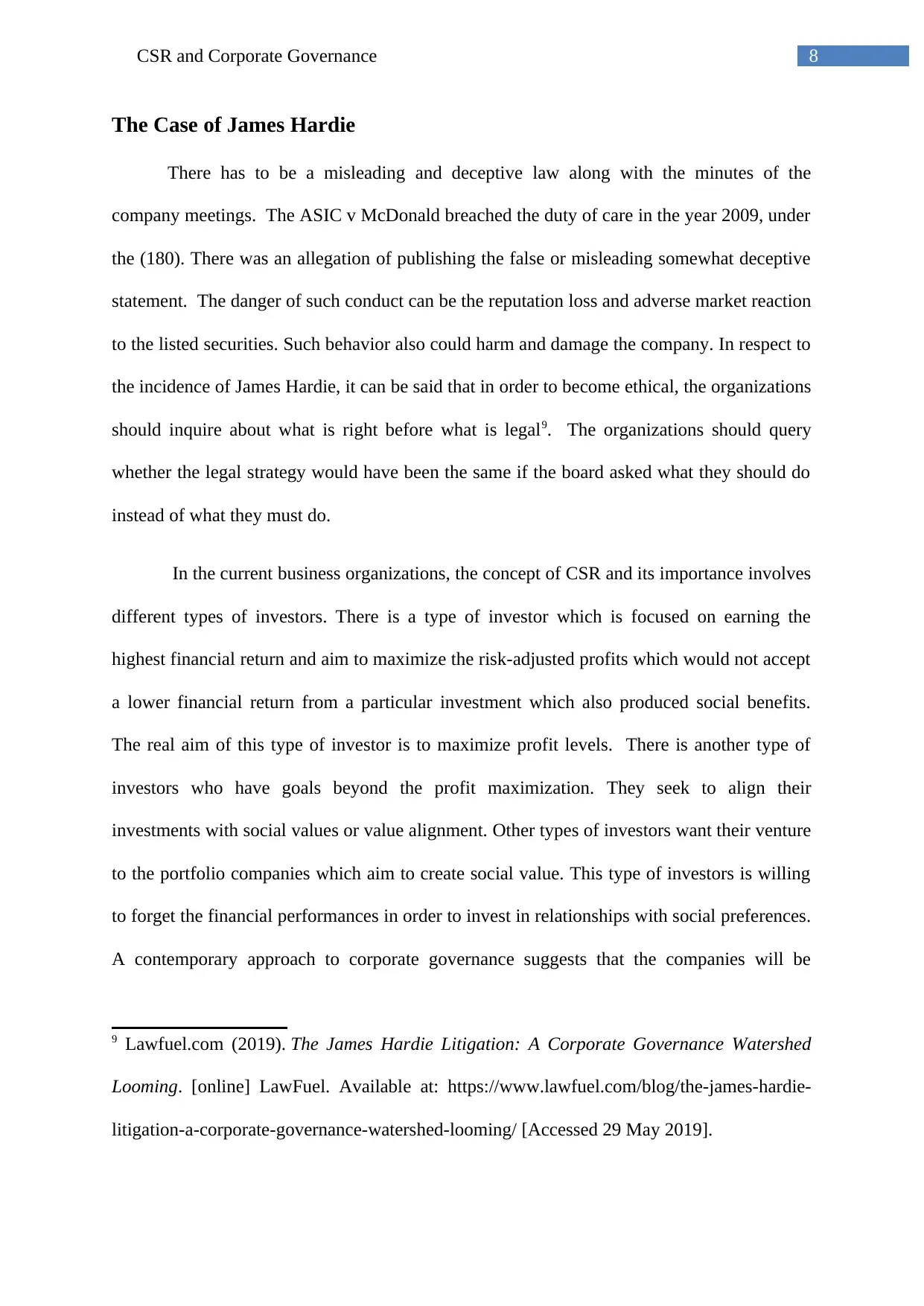
8CSR and Corporate Governance
The Case of James Hardie
There has to be a misleading and deceptive law along with the minutes of the
company meetings. The ASIC v McDonald breached the duty of care in the year 2009, under
the (180). There was an allegation of publishing the false or misleading somewhat deceptive
statement. The danger of such conduct can be the reputation loss and adverse market reaction
to the listed securities. Such behavior also could harm and damage the company. In respect to
the incidence of James Hardie, it can be said that in order to become ethical, the organizations
should inquire about what is right before what is legal9. The organizations should query
whether the legal strategy would have been the same if the board asked what they should do
instead of what they must do.
In the current business organizations, the concept of CSR and its importance involves
different types of investors. There is a type of investor which is focused on earning the
highest financial return and aim to maximize the risk-adjusted profits which would not accept
a lower financial return from a particular investment which also produced social benefits.
The real aim of this type of investor is to maximize profit levels. There is another type of
investors who have goals beyond the profit maximization. They seek to align their
investments with social values or value alignment. Other types of investors want their venture
to the portfolio companies which aim to create social value. This type of investors is willing
to forget the financial performances in order to invest in relationships with social preferences.
A contemporary approach to corporate governance suggests that the companies will be
9 Lawfuel.com (2019). The James Hardie Litigation: A Corporate Governance Watershed
Looming. [online] LawFuel. Available at: https://www.lawfuel.com/blog/the-james-hardie-
litigation-a-corporate-governance-watershed-looming/ [Accessed 29 May 2019].
The Case of James Hardie
There has to be a misleading and deceptive law along with the minutes of the
company meetings. The ASIC v McDonald breached the duty of care in the year 2009, under
the (180). There was an allegation of publishing the false or misleading somewhat deceptive
statement. The danger of such conduct can be the reputation loss and adverse market reaction
to the listed securities. Such behavior also could harm and damage the company. In respect to
the incidence of James Hardie, it can be said that in order to become ethical, the organizations
should inquire about what is right before what is legal9. The organizations should query
whether the legal strategy would have been the same if the board asked what they should do
instead of what they must do.
In the current business organizations, the concept of CSR and its importance involves
different types of investors. There is a type of investor which is focused on earning the
highest financial return and aim to maximize the risk-adjusted profits which would not accept
a lower financial return from a particular investment which also produced social benefits.
The real aim of this type of investor is to maximize profit levels. There is another type of
investors who have goals beyond the profit maximization. They seek to align their
investments with social values or value alignment. Other types of investors want their venture
to the portfolio companies which aim to create social value. This type of investors is willing
to forget the financial performances in order to invest in relationships with social preferences.
A contemporary approach to corporate governance suggests that the companies will be
9 Lawfuel.com (2019). The James Hardie Litigation: A Corporate Governance Watershed
Looming. [online] LawFuel. Available at: https://www.lawfuel.com/blog/the-james-hardie-
litigation-a-corporate-governance-watershed-looming/ [Accessed 29 May 2019].
⊘ This is a preview!⊘
Do you want full access?
Subscribe today to unlock all pages.

Trusted by 1+ million students worldwide
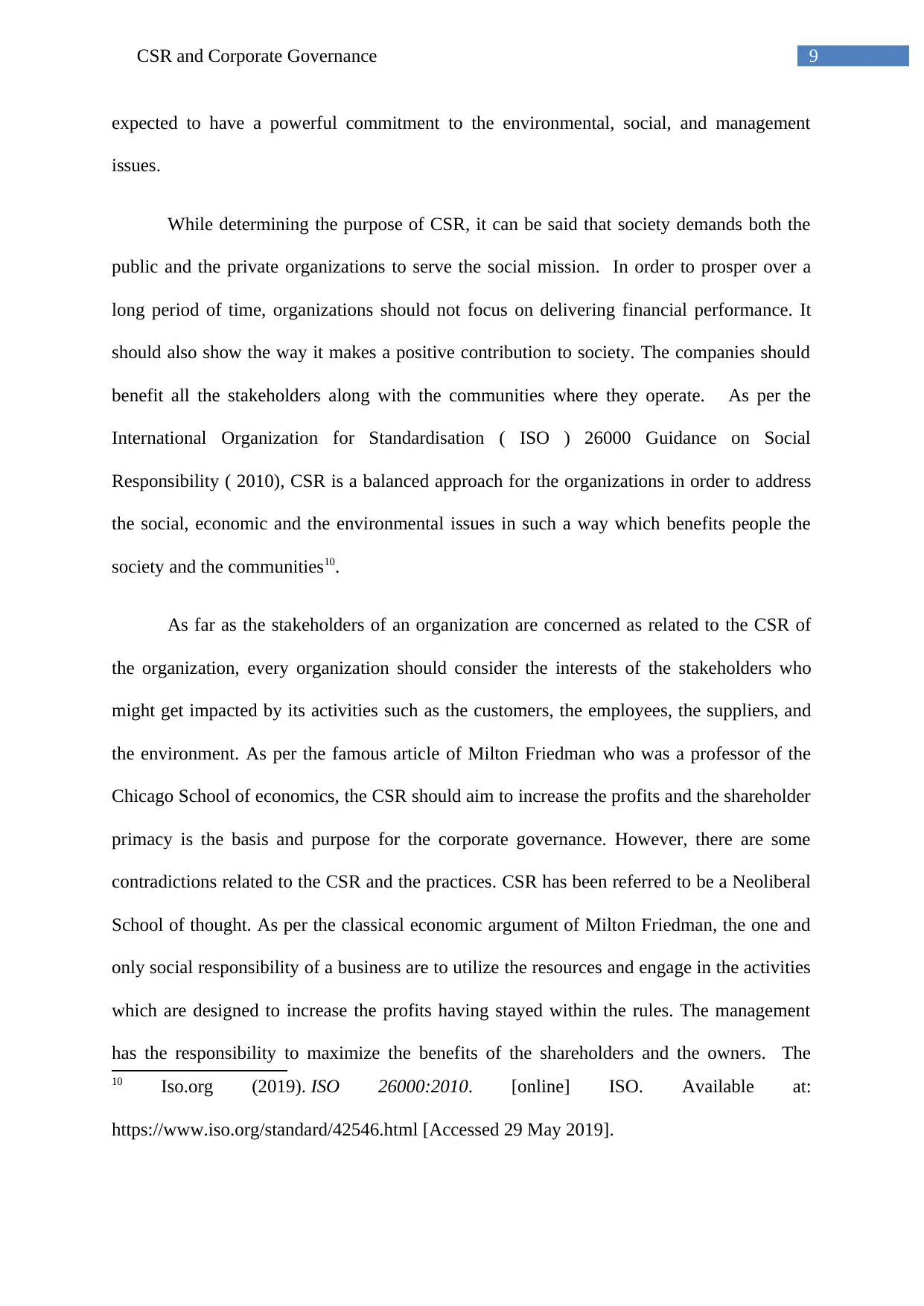
9CSR and Corporate Governance
expected to have a powerful commitment to the environmental, social, and management
issues.
While determining the purpose of CSR, it can be said that society demands both the
public and the private organizations to serve the social mission. In order to prosper over a
long period of time, organizations should not focus on delivering financial performance. It
should also show the way it makes a positive contribution to society. The companies should
benefit all the stakeholders along with the communities where they operate. As per the
International Organization for Standardisation ( ISO ) 26000 Guidance on Social
Responsibility ( 2010), CSR is a balanced approach for the organizations in order to address
the social, economic and the environmental issues in such a way which benefits people the
society and the communities10.
As far as the stakeholders of an organization are concerned as related to the CSR of
the organization, every organization should consider the interests of the stakeholders who
might get impacted by its activities such as the customers, the employees, the suppliers, and
the environment. As per the famous article of Milton Friedman who was a professor of the
Chicago School of economics, the CSR should aim to increase the profits and the shareholder
primacy is the basis and purpose for the corporate governance. However, there are some
contradictions related to the CSR and the practices. CSR has been referred to be a Neoliberal
School of thought. As per the classical economic argument of Milton Friedman, the one and
only social responsibility of a business are to utilize the resources and engage in the activities
which are designed to increase the profits having stayed within the rules. The management
has the responsibility to maximize the benefits of the shareholders and the owners. The
10 Iso.org (2019). ISO 26000:2010. [online] ISO. Available at:
https://www.iso.org/standard/42546.html [Accessed 29 May 2019].
expected to have a powerful commitment to the environmental, social, and management
issues.
While determining the purpose of CSR, it can be said that society demands both the
public and the private organizations to serve the social mission. In order to prosper over a
long period of time, organizations should not focus on delivering financial performance. It
should also show the way it makes a positive contribution to society. The companies should
benefit all the stakeholders along with the communities where they operate. As per the
International Organization for Standardisation ( ISO ) 26000 Guidance on Social
Responsibility ( 2010), CSR is a balanced approach for the organizations in order to address
the social, economic and the environmental issues in such a way which benefits people the
society and the communities10.
As far as the stakeholders of an organization are concerned as related to the CSR of
the organization, every organization should consider the interests of the stakeholders who
might get impacted by its activities such as the customers, the employees, the suppliers, and
the environment. As per the famous article of Milton Friedman who was a professor of the
Chicago School of economics, the CSR should aim to increase the profits and the shareholder
primacy is the basis and purpose for the corporate governance. However, there are some
contradictions related to the CSR and the practices. CSR has been referred to be a Neoliberal
School of thought. As per the classical economic argument of Milton Friedman, the one and
only social responsibility of a business are to utilize the resources and engage in the activities
which are designed to increase the profits having stayed within the rules. The management
has the responsibility to maximize the benefits of the shareholders and the owners. The
10 Iso.org (2019). ISO 26000:2010. [online] ISO. Available at:
https://www.iso.org/standard/42546.html [Accessed 29 May 2019].
Paraphrase This Document
Need a fresh take? Get an instant paraphrase of this document with our AI Paraphraser
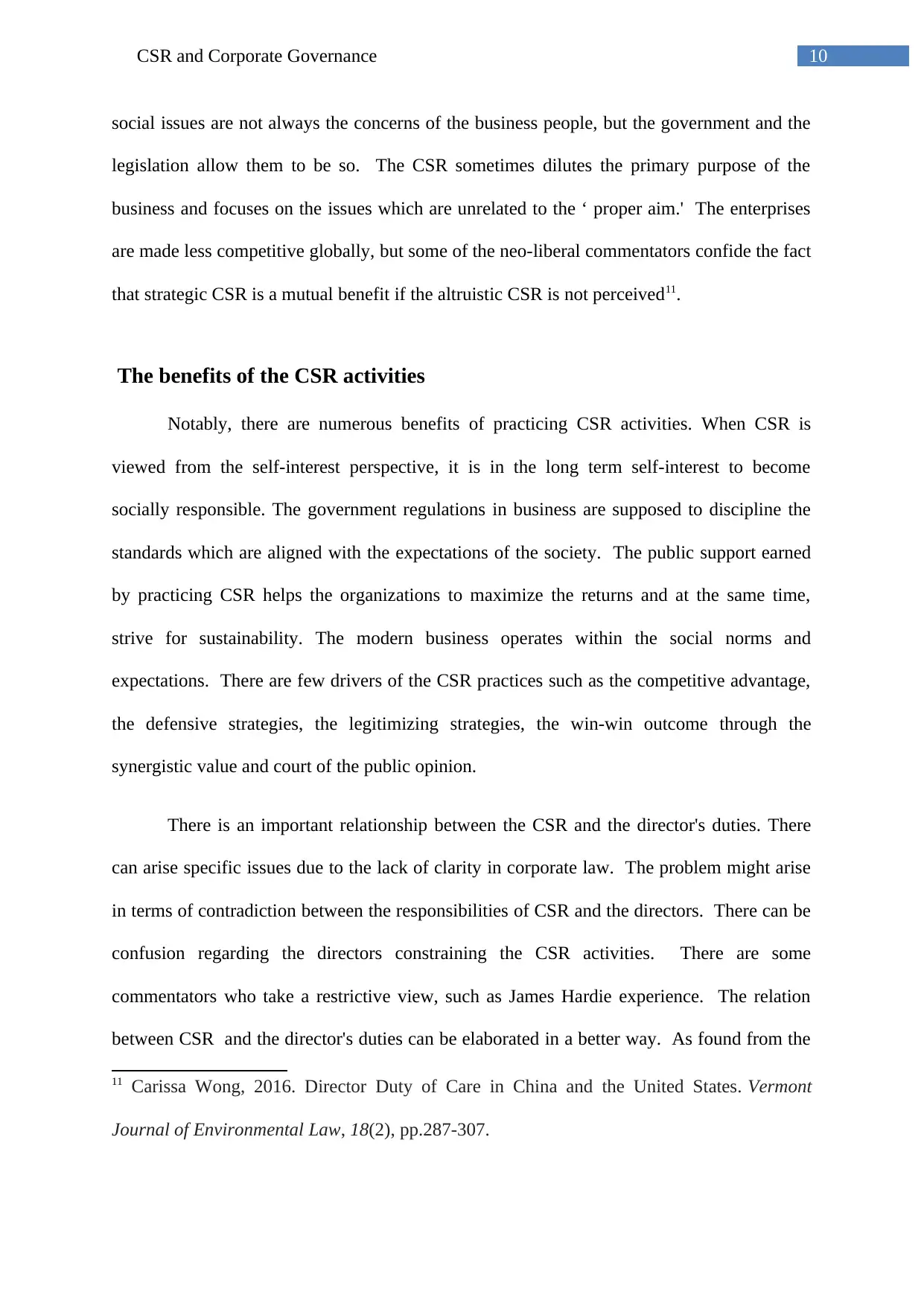
10CSR and Corporate Governance
social issues are not always the concerns of the business people, but the government and the
legislation allow them to be so. The CSR sometimes dilutes the primary purpose of the
business and focuses on the issues which are unrelated to the ‘ proper aim.' The enterprises
are made less competitive globally, but some of the neo-liberal commentators confide the fact
that strategic CSR is a mutual benefit if the altruistic CSR is not perceived11.
The benefits of the CSR activities
Notably, there are numerous benefits of practicing CSR activities. When CSR is
viewed from the self-interest perspective, it is in the long term self-interest to become
socially responsible. The government regulations in business are supposed to discipline the
standards which are aligned with the expectations of the society. The public support earned
by practicing CSR helps the organizations to maximize the returns and at the same time,
strive for sustainability. The modern business operates within the social norms and
expectations. There are few drivers of the CSR practices such as the competitive advantage,
the defensive strategies, the legitimizing strategies, the win-win outcome through the
synergistic value and court of the public opinion.
There is an important relationship between the CSR and the director's duties. There
can arise specific issues due to the lack of clarity in corporate law. The problem might arise
in terms of contradiction between the responsibilities of CSR and the directors. There can be
confusion regarding the directors constraining the CSR activities. There are some
commentators who take a restrictive view, such as James Hardie experience. The relation
between CSR and the director's duties can be elaborated in a better way. As found from the
11 Carissa Wong, 2016. Director Duty of Care in China and the United States. Vermont
Journal of Environmental Law, 18(2), pp.287-307.
social issues are not always the concerns of the business people, but the government and the
legislation allow them to be so. The CSR sometimes dilutes the primary purpose of the
business and focuses on the issues which are unrelated to the ‘ proper aim.' The enterprises
are made less competitive globally, but some of the neo-liberal commentators confide the fact
that strategic CSR is a mutual benefit if the altruistic CSR is not perceived11.
The benefits of the CSR activities
Notably, there are numerous benefits of practicing CSR activities. When CSR is
viewed from the self-interest perspective, it is in the long term self-interest to become
socially responsible. The government regulations in business are supposed to discipline the
standards which are aligned with the expectations of the society. The public support earned
by practicing CSR helps the organizations to maximize the returns and at the same time,
strive for sustainability. The modern business operates within the social norms and
expectations. There are few drivers of the CSR practices such as the competitive advantage,
the defensive strategies, the legitimizing strategies, the win-win outcome through the
synergistic value and court of the public opinion.
There is an important relationship between the CSR and the director's duties. There
can arise specific issues due to the lack of clarity in corporate law. The problem might arise
in terms of contradiction between the responsibilities of CSR and the directors. There can be
confusion regarding the directors constraining the CSR activities. There are some
commentators who take a restrictive view, such as James Hardie experience. The relation
between CSR and the director's duties can be elaborated in a better way. As found from the
11 Carissa Wong, 2016. Director Duty of Care in China and the United States. Vermont
Journal of Environmental Law, 18(2), pp.287-307.

11CSR and Corporate Governance
article of Paul Redmond on the Director's Duties and Corporate Social Responsiveness, the
company laws should acknowledge that it has no mechanism of ensuring the obligation to
meet social responsibility12. The article of Paul Redmond shows the gap of the director's
duties in the Australian law, which can result in weak guidance to the directors. The directors
failed to respond to the social expectations, the stakeholder claim, resulted in discouraging
the CSR initiatives and deny the directors about the clarity of the protection from the liability
which they were entitled to expect. According to the Australian Joint Parliamentary Inquiry
on CSR ( 2006), there is nothing in the current legislation that genuinely constrains the
directors who wish to contribute to the continued development of the corporations having
taken into account the stakeholders interests other than the shareholders.
Through the past decades, there has been an extraordinary efflorescence of the CSR
standards and norms of the responsibility for the impacts of the human rights impacts of
business operations and social relationships. The emergence of the global economy has made
the soft law respond. The soft laws were also expected to be addressing the governance gaps
as created by the globalization. The businesses have poorly understood the implications of
the civil regulations in support of corporate law and the practices. As an example, the James
Hardie case clearly points to the dangers when the duties of the directors stand in the way of
social norms responsiveness in terms or corporate responsibility.
Paul Redmond on social responsiveness
The article of Paul Redmond drags three points to promote the responsiveness of the
directors and the managers, which will enhance the long term shareholder value and the non-
12 Stuebs, Marty. and Li Sun., 2015. Corporate governance and social
responsibility. International Journal of Law and Management, 57(1), pp.38-52.
article of Paul Redmond on the Director's Duties and Corporate Social Responsiveness, the
company laws should acknowledge that it has no mechanism of ensuring the obligation to
meet social responsibility12. The article of Paul Redmond shows the gap of the director's
duties in the Australian law, which can result in weak guidance to the directors. The directors
failed to respond to the social expectations, the stakeholder claim, resulted in discouraging
the CSR initiatives and deny the directors about the clarity of the protection from the liability
which they were entitled to expect. According to the Australian Joint Parliamentary Inquiry
on CSR ( 2006), there is nothing in the current legislation that genuinely constrains the
directors who wish to contribute to the continued development of the corporations having
taken into account the stakeholders interests other than the shareholders.
Through the past decades, there has been an extraordinary efflorescence of the CSR
standards and norms of the responsibility for the impacts of the human rights impacts of
business operations and social relationships. The emergence of the global economy has made
the soft law respond. The soft laws were also expected to be addressing the governance gaps
as created by the globalization. The businesses have poorly understood the implications of
the civil regulations in support of corporate law and the practices. As an example, the James
Hardie case clearly points to the dangers when the duties of the directors stand in the way of
social norms responsiveness in terms or corporate responsibility.
Paul Redmond on social responsiveness
The article of Paul Redmond drags three points to promote the responsiveness of the
directors and the managers, which will enhance the long term shareholder value and the non-
12 Stuebs, Marty. and Li Sun., 2015. Corporate governance and social
responsibility. International Journal of Law and Management, 57(1), pp.38-52.
⊘ This is a preview!⊘
Do you want full access?
Subscribe today to unlock all pages.

Trusted by 1+ million students worldwide
1 out of 17
Related Documents
Your All-in-One AI-Powered Toolkit for Academic Success.
+13062052269
info@desklib.com
Available 24*7 on WhatsApp / Email
![[object Object]](/_next/static/media/star-bottom.7253800d.svg)
Unlock your academic potential
Copyright © 2020–2025 A2Z Services. All Rights Reserved. Developed and managed by ZUCOL.





